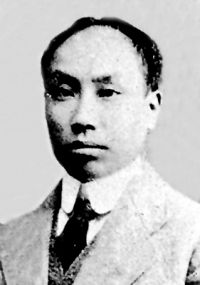Difference between revisions of "Chen Duxiu"
imported>Ciic |
imported>Ciic |
||
| (One intermediate revision by the same user not shown) | |||
| Line 1: | Line 1: | ||
| − | |||
| − | |||
[[file:Chen Duxiu 陈独秀.JPEG|thumb|200px|Chen Duxiu 陈独秀]] | [[file:Chen Duxiu 陈独秀.JPEG|thumb|200px|Chen Duxiu 陈独秀]] | ||
| − | '''Chen Duxiu''' (also know as Chen Zhongfu and Chen Shi'an) was born in Huaining, Anhui Province. After coming under the influence of modern Western thought while studying at Zhongxi Qiushi College in Hangzhou in 1897, he wrote political commentaries under the title "On the Situation Along the Yangtze Rive," which spreads patriotic ideas against the rule of the Qing Dynasty. Chen edited ''Anhui Vernacular Daily'' in 1899, keeping up his attack on the prevailing political situation. He went to Japan twice after 1901 for study and published the novels Tragic Society and Dark Heavenly Kingdom in newspapers at home, both of which expose the Manchu autocracy and foster bourgeois concepts democracy and equality. | + | '''Chen Duxiu''' (陈独秀1879-1942) (also know as Chen Zhongfu and Chen Shi'an) was born in Huaining, Anhui Province. After coming under the influence of modern Western thought while studying at Zhongxi Qiushi College in Hangzhou in 1897, he wrote political commentaries under the title "On the Situation Along the Yangtze Rive," which spreads patriotic ideas against the rule of the Qing Dynasty. Chen edited ''Anhui Vernacular Daily'' in 1899, keeping up his attack on the prevailing political situation. He went to Japan twice after 1901 for study and published the novels Tragic Society and Dark Heavenly Kingdom in newspapers at home, both of which expose the Manchu autocracy and foster bourgeois concepts democracy and equality. |
When the [[Chinese Revolution of 1911]] began, Chen was secretary general of the Anhui Provincial Governor's Office and director of the provincial higher education. In September 1915, '''Chen Duxiu''' launched ''New Youth'' magazine to promote democracy and science against feudal culture. Propagating the bourgeois new culture and new system, Chen was a major force in initiating the May 4th New Culture Movement in China. | When the [[Chinese Revolution of 1911]] began, Chen was secretary general of the Anhui Provincial Governor's Office and director of the provincial higher education. In September 1915, '''Chen Duxiu''' launched ''New Youth'' magazine to promote democracy and science against feudal culture. Propagating the bourgeois new culture and new system, Chen was a major force in initiating the May 4th New Culture Movement in China. | ||
Latest revision as of 05:10, 7 June 2013
Chen Duxiu (陈独秀1879-1942) (also know as Chen Zhongfu and Chen Shi'an) was born in Huaining, Anhui Province. After coming under the influence of modern Western thought while studying at Zhongxi Qiushi College in Hangzhou in 1897, he wrote political commentaries under the title "On the Situation Along the Yangtze Rive," which spreads patriotic ideas against the rule of the Qing Dynasty. Chen edited Anhui Vernacular Daily in 1899, keeping up his attack on the prevailing political situation. He went to Japan twice after 1901 for study and published the novels Tragic Society and Dark Heavenly Kingdom in newspapers at home, both of which expose the Manchu autocracy and foster bourgeois concepts democracy and equality.
When the Chinese Revolution of 1911 began, Chen was secretary general of the Anhui Provincial Governor's Office and director of the provincial higher education. In September 1915, Chen Duxiu launched New Youth magazine to promote democracy and science against feudal culture. Propagating the bourgeois new culture and new system, Chen was a major force in initiating the May 4th New Culture Movement in China.
Chen Duxiu became principal of the College of Art of Beijing University in 1917. In collaboration with Li Dazhao, Chen launched Weekly Review to promote Marxism-Leninism and raise the slogan "revolution in literature." Thus, Chen was one of the founders and leading figures of the May 4th Movement.
Together with other Communists, Chen Duxiu organized the Communist Party of China; he served as general secretary for the first through fifth national congresses of the Party. In the latter part of the First Revolutionary Civil War Period (1924-1927), Chen Duxiu committed serious ideological error as a chief representative of the Right-wing opportunist Party line. He was removed from his post in 1927.
After the failure of the Revolution of 1927, Chen turned against the revolution and formed an anti-Party clique. In November 1929, Chen was expelled from the Party and become a Trotskyite. He was elected to the central committee of the Chinese Trotskyists.
In 1932, Chen was arrested by the Kuomintang in Shanghai and sentenced to 13 years in prison as a political prisoner for alleged "crimes" endangering the republic. He was released at the outbreak of the War of Resistance Against Japan and died of illness in Jiangjin, Sichuan Province, on May 27, 1942.
His main works include "On the Situation Along the Yangtze River" (1897), Tragic Society (1902), "On Drama" (1904), "To Young People" (1915), "On Literary Revolution" (1917), and "My Reply to the Charges Against New Youth" (1919).
